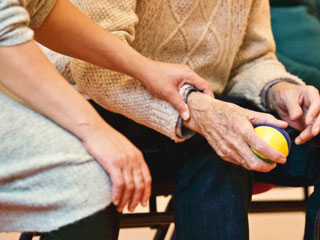
It’s only natural for people with Parkinson’s to worry about how the disease will affect their lives. As hard as it is, patients need to adjust to the new reality that they may not be able to carry out simple tasks as independently as before — something that can greatly dent their confidence. At Plexus, we want to help such individuals and their families overcome these challenges and continue to function as normally as possible.
The Five Stages of Parkinson’s Disease
Below are some of the symptoms that can arise at different stages of Parkinson’s disease:
Stage 1
At this stage, the progression of the disease is so mild that it could be missed by most people. On closer observation, however friends and family might notice:
- Intermittent or occasional tremors (in one side of the body only)
- Rigid muscles
- Slower movements
- Slight changes in facial expressions
Stage 2
By this stage, patients start experiencing more visible symptoms, such as:
- Frequent tremors (in the whole body)
- Lack of facial expressions
- Impaired speech, characterized by overly loud or soft volume, monotonous
- voice, or slurred speech
- Unstable posture
Stage 3
Patients in this phase of the disease experience more frequent and intense symptoms compared to the previous phase and can benefit from treatments such as occupational therapy. Their symptoms include:
- Frequent falls that stem from lack of balance
- Slower reflexes
- Mild memory loss
- Involuntary movements
Stage 4
Patients increasingly lose their ability to perform tasks without assistance when they transition from stage 3 to 4. By now, they begin to exhibit severe symptoms that include:
- Visible instability when they stand or walk
- Inability to move rapidly
- Difficulty in taking care of themselves
Stage 5
A person going through the fifth stage of Parkinson’s disease will require maximum assistance and supervision at all times. These patients are debilitated by:
- Extremely stiff and rigid muscles
- Inability to complete tasks and freezing mid task
- Hallucinations and delusions
- Dementia (affecting potentially 75 percent of patients)
Parkinson’s Disease And Quality of Life
During the 1950s, experts proposed a list of activities that healthy adults must be able to do in order to have a normal personal and social life. To this day, Activities of Daily Living (ADL) and Instrumental Activities of Daily Living (IADL) are definitive indicators of a person’s Quality of Life (QoL). Parkinson’s affects all aspects of a person’s QoL in the following ways:
Activities of Daily Living (ADL)
This category includes self-care activities that we do on a daily basis, such as:
- Personal hygiene
Parkinson’s often causes patients to sweat a lot, making frequent baths absolutely necessary. Unfortunately, tremors and muscle stiffness can restrict this — preventing patients from maintaining their own hygiene independently. - Dressing and grooming
As the disease progresses, patients may start having trouble with clothes that have fine zippers and buttons, making assistance while dressing a must. - Toilet hygiene
Constipation and incontinence are some of the regularly occurring symptoms of Parkinson’s disease. - Eating and drinking
Tremors in the face and dysphagia (a condition that hinders swallowing) can cause significant trouble to patients while eating. - Moving around
In the early stages of the disease, Parkinson’s symptoms merely slow down a person’s pace or destabilize them when they stand. However, in extreme cases, it is also known to cause patients to freeze mid task and eventually, become entirely bedridden.
Instrumental Activities of Daily Living (IADL)
This category includes activities that may not be vital for the patient’s survival, but are necessary for independent living, such as:
- Cleaning and maintaining the house
With time, Parkinson’s can severely restrict patients’ movements and their ability to walk freely around the house. - Socializing within the community
Regardless of the stage, patients with Parkinson’s can all benefit from the company of their friends and family. These gatherings, and the emotional benefits they offer patients, can go a long way in keeping up their morale and mental health. - Preparing meals
Patients suffering from advanced symptoms of Parkinson’s often struggle with cooking by themselves — making this essential activity an insurmountable challenge. - Shopping for groceries and necessities
In some patients, the onset of dementia can severely affect their ability to make rational decisions with regards to money. - Taking prescribed medications
One of the symptoms of progressive neurodegeneration, which starts affecting patients’ everyday tasks almost immediately, is frequent short term memory loss. This can cause frequent lapses of memory and make patients miss the timings for their prescribed medication. - Using the telephone or other forms of communication
Dysphagia and facial tremors may also affect patients’ voice and language fluency over the phone.
How Can Plexus Help?
Plexus specializes in rehabilitating patients with Parkinson’s — by making their lives as normal as possible. We do this through our personalized treatment approach, where a routine is designed based on the patient’s interests and motivations. During the course of such intensive treatment routines, our Multidisciplinary Team — comprising neurologists and therapists — works together with the patient. In addition to the medical treatment, our patients are also given a lot of encouragement and support, helping them recover faster. The result of such a holistic treatment — as reflected in Mr A\’s battle with Parkinson\’s — is that our patients get back to their normal lives with a renewed belief in themselves.
Timely treatment can help reduce the effects of Parkinson’s — giving patients a better chance at living a fuller life. This is what drives us to create a supportive environment for our patients at Plexus. To know more about Parkinson’s treatment in Bangalore and book an appointment, visit our Centre or email us at info@plexusnc.com.










